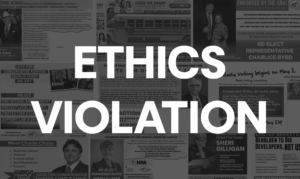Three candidates in three council races in Fayetteville and Tyrone are black, the most minority candidates in local elections in Fayette history. The Fayetteville candidate, pastor Ed Johnson, is the past president of the Fayette chapter of the National Association for the Advancement of Colored People (NAACP).
Is this coincidental or does this unprecedented slate have anything to do with the NAACP’s district voting lawsuit against Fayette County?
The Fayette County attorney who filed the voting rights lawsuit — Wayne Kendall — says, “No,” there’s no connection.
The NAACP federal lawsuit claims that the current at-large voting method used for the Fayette County Commission and the Fayette County Board of Education weakens minority voting strength and denies those voters an opportunity to elect a candidate of their choice.
It stands to reason that the increasing percentage of blacks living in Fayette County and its municipalities would logically lead to increasing numbers of black candidates running for elected office.
The Citizen asked Fayette County resident and attorney Wayne Kendall — who represents the local NAACP branch in the lawsuit — if there was any significance to black candidates qualifying in the Tyrone and Fayetteville races within weeks of the federal lawsuit being filed, since no blacks have ever run in Tyrone elections and only one for a Fayetteville post more than 30 years ago.
“(The suit) doesn’t have anything to do with them running,” Kendall said.
And do the local council races in Fayetteville and Tyrone featuring black candidates have any consequence on the suit if one or more of the black candidates win?
The answer again, said Kendall, is essentially “no.”
“For the purposes of this suit (their winning) is somewhat irrelevant,” said Kendall.
Asked whether Fayetteville and Tyrone would be wrapped into the current lawsuit if the black candidates lose on Nov. 8, Kendall said they would not.
“(Tyrone and Fayetteville) are separate communities with separate histories,” Kendall said.
Kendall also noted, however, that future litigation could not necessarily be ruled out.
Citing Tyrone as an example, Kendall said that with at-large voting the circumstances could pave the way for a lawsuit if a black candidate could not get elected based on the factors promulgated by the U.S. Supreme Court.
The federal suit filed in August was directed at the at-large method of electing members of the Fayette County Commission and the Fayette County Board of Education with the aim of eliminating that method of electing candidates. If successful, the suit hopes to have the methodology changed to require district voting.
The suit insists that the current at-large voting process “has discriminatory effects on the voting strength of Fayette County’s black community” and violates section 2 of the federal Voting Rights act.
Though the large majority of candidates running for elections for posts in the various Fayette elections are white, it is not without precedent to have blacks seeking office. A recent example came in the 2006 Fayette County Commission special election where Robert Horgan received more than 51 percent of the vote, besting the combined votes of the four black candidates on the ballot.
The lawsuit claims that the current at-large voting system used for the county commission and the board of education weakens the voting strength of minority voters and, consequently, denies those voters an opportunity to elect a candidate of their choice.
“Blacks in Fayette County have suffered and continue to suffer discrimination, including a history of neglect by unresponsive elected officials, and bear the effects of that discrimination today,” the lawsuit claims.












Leave a Comment
You must be logged in to post a comment.